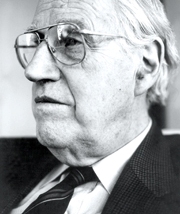04 July 2012
 Iodine deficiency is still a problem in Australia today and about 30 per cent of the world’s population remains at risk of the preventable condition that can cause everything from mild learning difficulties to sever retardation, cretinism and stillbirth.
Iodine deficiency is still a problem in Australia today and about 30 per cent of the world’s population remains at risk of the preventable condition that can cause everything from mild learning difficulties to sever retardation, cretinism and stillbirth.
That is the message from Australian scientific statesman Dr Basil Hetzel more than 40 years after his seminal studies illuminated iodine’s essential role in brain development. And it is a message he will be driving home in a lecture at the University of South Australia’s Sansom Institute for Health Research on July 11.
In Papua New Guinea in the 1960s Dr Hetzel’s research team was the first to prove that brain damage could be prevented by correcting iodine deficiency before pregnancy; he went on to spearhead an international campaign working with the World Health Organisation (WHO) and UNICEF that has seen iodine supplementation programs jump from covering 20 per cent of the world’s population before 1990 to around 70 per cent today.
Despite the progress that has been made – it’s estimated more than 80 million newborns have been protected from iodine deficiency through iodised table salt alone – Dr Hetzel says much more work needs to be done.
“We’ve seen incredible success in places like China, where they’ve managed to address this problem by making it a major priority, but there are still countries, such as those in central and western Africa, where poor infrastructure, war and low levels of education make it harder to reach people,” he says.
“There still is a real deficiency in parts of Australia. There’s good evidence that school children are affected and they’re not getting enough iodine; it’s a matter of some urgency that intake is increased.
“I’ve seen the impact that iodine supplementation can make – in countries like Papua New Guinea and Nepal, where they used to see a lot of cretinism and goitres, those things have disappeared. But it takes a lot of organisation and there are still two billion people at risk, so much more work remains to be done.”
Dr Hetzel will talk about past successes and current challenges in the global push to eliminate iodine deficiency in a Sansom Institute seminar at the University of South Australia’s City East campus on Wednesday 11 July 2012 at 4.00pm, (H2-02, Basil Hetzel Building, City East Campus, Frome Road) . RSVP to sansominstitute@unisa.edu.au
Media Contact: Dr Basil Hetzel phone: 8161 7021 or 8267 3768
Charlotte Chalklen, Sansom Institute for Health Research mobile: 0421 855 835 email: charlotte.chalklen@unisa.edu.au
Michèle Nardelli office: 08 8302 0966 mobile: 0418 823 673 email: michele.nardelli@unisa.edu.au




